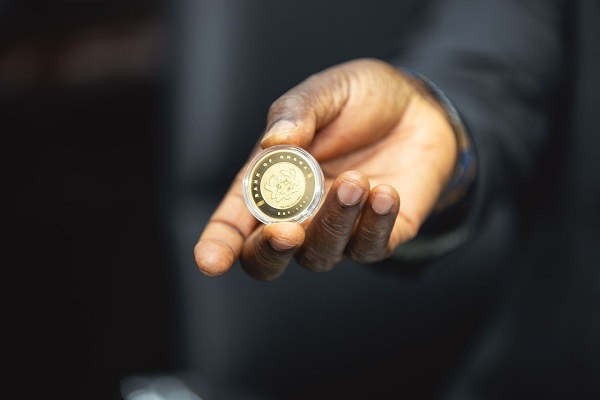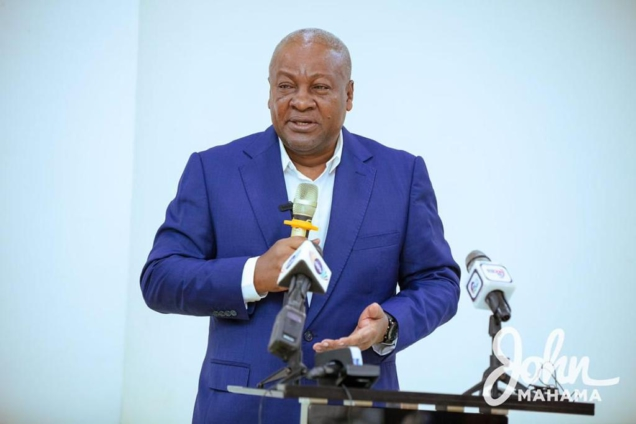BoG Gold Coins Investment: A safe haven or another risky gamble?

Ghana’s financial landscape has changed significantly over the years, with both lucrative investment opportunities and devastating financial losses. For many people, investing is more than just a way to increase their wealth; it’s also a way to secure their future and protect their hard-earned money.
However, previous experiences, particularly the failure of fraudulent schemes such as Menzgold, have made many Ghanaians skeptical of new investment opportunities.
The Bank of Ghana (BoG) recently launched a gold coin investment initiative, positioning it as a stable and secure option for those seeking to diversify their portfolios. This move aims to influence the demand for foreign currencies, particularly the U.S dollar, as a store of value which could ease some pressure on the cedi in the forex market.
Gold has traditionally been regarded as a dependable store of value, particularly during periods of currency rate instability and economic volatilities. For centuries, it has represented wealth and security, attracting both individual and institutional investors.
The BoG’s gold coin initiative taps into this sentiment by allowing Ghanaians to invest in physical gold. However, the question remains: Is this investment truly a safe haven, or is it another risky gamble, similar to previous schemes that left many financially disabled?
In response to this important question, this article, as is typical of me, provides a thorough examination of the BoG’s gold coin initiative, drawing lessons from previous schemes such as Menzgold and DKM Financial Services.
It provides a comparison of BoG gold coin investments to what is known in the past to assist investors in weighing the potential risks and rewards of this new investment opportunity. Ghanaians can make better financial decisions if they understand the difference between legitimate, regulated opportunities and speculative schemes.
What is the problem?
In recent years, Ghanaians have witnessed a surge in various investment schemes, with some offering tantalizing returns while others collapsing, leaving investors in despair. One notable example is the defunct Menzgold investment scheme, which promised extraordinary returns on gold-backed investments, attracting top-tier professionals and financial experts but ended in turmoil, resulting in significant losses for many investors.
Now, with the Bank of Ghana’s (BoG) initiative to introduce a gold coin, announced on September 27th, 2024 by the Monetary Policy Committee (MPC), the key question arises: Is gold coin investment a truly secure financial refuge for Ghanaians seeking stability, or does it represent a risky gamble that requires careful consideration and risk management?
Addressing this question is critical for assisting potential investors in making informed decisions, especially in light of inflationary pressures, sky-rocketing desire to hold dollars as a store of value, the continuous depreciation of the Ghanaian currency, and previous experiences with failed gold-related schemes such as Menzgold. Can BoG succeed with the gold-coin strategic investment initiative?
Understanding the BoG’s Gold Coin Investment
The Bank of Ghana’s gold coin initiative is part of its effort to tap into the global demand for gold and provide Ghanaians with a new, reliable investment avenue.
Gold has long been viewed as a “safe haven” investment, especially during economic downturns and periods of currency instability. In many parts of the world, gold investments offer stability and protection against inflation, making them a popular choice for both individuals and institutions.
However, unlike Menzgold’s promises of high returns, the BoG’s gold coin investment seems to be structured differently. It is rooted in more conventional practices, with no inflated promises of exponential profits. The BoG, as a central financial institution, also offers a level of regulatory oversight and transparency, providing reassurance to cautious investors.
Lessons from Menzgold: High Returns, High Risk>
To many Ghanaians, Menzgold’s collapse serves as a painful reminder of what can happen when investments lack regulatory oversight and when returns seem “too good to be true.” Menzgold attracted a broad section of the population with its aggressive marketing and promises of gold-backed returns. However, the company’s operations fell outside the scope of Ghana’s financial regulatory framework, leading to concerns about the legitimacy and safety of investors’ funds.
Eventually, the government’s interventions and investigations revealed that Menzgold was operating illegally. Investors faced devastating losses, many of whom had invested their life savings, expecting high returns with minimal risk. This created skepticism about gold-related investments, even in a nation rich in the precious metal.
Lessons from DKM Financial Services: Trusting Unregulated Institutions
Before the Menzgold collapse, the DKM Financial Services crisis of 2015 shocked the nation. DKM was a microfinance institution that offered unusually high interest rates on deposits, promising significant returns on investments. Many Ghanaians, particularly in rural areas, flocked to DKM, hoping to benefit from the attractive interest rates. However, much like Menzgold, DKM’s promises were too good to be true.
DKM’s operations were riddled with poor financial management and lacked regulatory compliance. The institution was not adequately supervised by the Bank of Ghana, and its business model was unsustainable, relying heavily on attracting new deposits to pay off existing investors. When the BoG intervened and froze DKM’s assets, the company collapsed, leaving many investors devastated and unable to recover their funds.
The DKM crisis teaches us the importance of regulatory oversight and the need to trust only legitimate, well-regulated financial institutions. Without the proper checks and balances, even seemingly successful businesses can fall apart, leading to significant financial losses for unsuspecting investors. Trusting an unregulated entity can be a risky gamble, one that can leave investors with no recourse when things go wrong.
Comparing BoG’s Gold Coin Initiative to Past Failures
The Bank of Ghana’s gold coin initiative differs significantly from schemes like Menzgold and DKM. Unlike those schemes, BoG’s gold coins are introduced under a legal and regulatory framework, providing a level of transparency and security that was absent in previous cases. The central bank, as the country’s leading financial institution, operates with the mandate of ensuring economic stability and protecting investors’ interests.
This is a far cry from the opaque and unsustainable practices of Menzgold and DKM. Furthermore, BoG’s gold coin initiative does not promise extraordinary returns or get-rich-quick opportunities. Instead, it is presented as a long-term store of value, capitalizing on gold’s historical role as a hedge against inflation and currency devaluation. The gold coins are designed for investors looking for a safe, stable investment, not for those seeking rapid wealth accumulation through speculative means.
The Risks and Considerations
While the BoG gold coin investment may be safer, it does not mean it is without risks. As with all investments, there are external factors that can impact its value. For example, gold prices are influenced by global market dynamics, inflation, and interest rates.
Other factors that needs to be considered before- hand, includes but not limited to issues relating to tax implications, storage cost, buy-backs(liquidity), time-horizons, geopolitical risk dynamics, and transactional cost. Perhaps, these are concerning factors that BoG is yet to clarify to potential gold-coin-investors. Gold has traditionally held its value over time, however short-term fluctuations can lead to losses for investors looking for quick returns.
Moreover, there is the psychological challenge for many investors in Ghana. With the scars left by Menzgold, some may still feel uneasy about investing in anything gold-related. Even with a reputable institution like the BoG leading the charge, winning back trust will be a gradual process.
Conclusion: Learning from the Past to Secure the Future
The introduction of the BoG’s gold coin initiative represents a promising opportunity for Ghanaians to invest in a safe and regulated product. However, is good to note the lessons from Menzgold and DKM Financial Services risks of pursuing high returns without proper oversight and regulation. Individuals who invest in BoG gold coins can benefit from gold’s historical stability while avoiding the pitfalls of speculative, high-risk ventures.
Finally, understanding the risks, conducting proper due diligence, asking the right questions, and placing trust in regulated, transparent financial institutions are essential for making informed investment decisions.
While no investment is without risk, the BoG’s gold coin initiative provides a far safer alternative to previous disastrous schemes. Learning from previous failures allows Ghanaians to approach this new opportunity with caution and confidence, ensuring a more secure financial future.
Source: Enoch Akuffu-Djobi, Contributor





